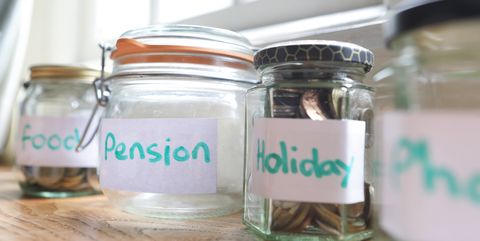This article is updated regularly
When the government-backed National Savings & Investments announced that it was slashing its interest rates in November 2020 to a measly 0.01%, millions of savers were left devastated and with little incentive to save.
For some time, NS&I had topped the best savings accounts charts, but its rate changes meant savers had to start looking elsewhere for decent returns.
To get the most from your savings, you should normally aim to earn an interest rate that beats inflation - otherwise your money is simply losing value over time. The current rate of inflation (the rate at which the price of goods and services increase) is 3.2% as of August 2021.
This high rate means it’s impossible to find a savings account that beats inflation at the moment, but it’s still important to find the best rate you possibly can.
Here’s everything you need to know about the best saving accounts for your money.
Use your current account to save
Most of us use our current accounts to manage money on a day to day basis, but look closer and you’ll see that some current accounts offer competitive interest rates if you're in credit and you deposit a certain amount in each month:
Nationwide Flex Direct offer 2% interest on balances up to £1,500 and 0.25% on anything above that for the first year. After the first 12 months, it’s 0.25% AER variable. You must deposit at least £1,000 into the account each month, which could be your salary for instance.
Virgin Money offer 2.02% on balances up to £1,000.
If you only have around £1,000 - £1,500 in savings, then it makes sense to take advantage of these rates. But there are other accounts you can look at if you are saving more.
Linked saving accounts
If you just want to put away a small amount each month, then you may be able to take advantage of some top rates - depending on where you bank. Here are some linked saver accounts worth considering if you have current accounts with them:
NatWest recently launched a linked Digital Regular Saver account that pays a top rate of 3% on your first £1,000. You have to save between £1 and £50 each month to get that rate, which you do by setting up a standing order via your Natwest current account.
With First Direct you can earn 1% on balances up to £3,600 if you save between £25 and £300 per month. You have to save for at least 12 months to get the rate and if you save less than £300 a month, you can carry the allowance into the following month.
Save for longer
If you are happy to lock your money away for a year or two and have more than £1,000 to stash away, then fixed rate bonds pay more than standard savings accounts.
Gatehouse Bank offer 1.6% on balances between £1,000 and £1m if you don’t touch your money for 18 months. If you tie up your money for two years, you can get a fixed rate account paying 1.75%.
Al Rayan Bank offer 1.55% for 18 months on balances between £5,000 and £1m.
Both these banks target Islamic customers and pay an ‘expected rate’ rather than ‘interest’ to stick to Islamic law. But don’t worry, your money is perfectly safe.
Help to Save
We don't hear about the government’s Help to Save scheme enough, but if you are entitled to Working Tax Credit or Universal Credit and on low income, then you could receive a bonus of 50p every time you save £1 over four years. The most you can pay into the account per month is £50.
To find out more and to see if you are eligible, go to gov.uk.
ISAs
Anyone over age 16 gets an ISA allowance of £20,000 — these are savings accounts that are not subject to tax.
You can get two types of ISA: a cash one where you earn interest or an investment one where your money is put to work in the stock market and has the potential to grow a lot more.
If you are looking at cash ISAs, the rates aren’t anything to shout about but you can earn 0.60% with Cynergy Bank and 0.55% with Coventry Building Society; both are easy access.
If you put your money in an investment account, you could earn as much around 5% to 8% in return. If you invest, then you must be willing to lock your money away for at least five years or more. The idea is that the longer you invest, the more time your money has to grow as well overcome any dips in the stock market.
Remember, investments can go up as well as down and you may get back less than you put in, although experts say historically, investments always do better than cash savings in the long term.
Find a list of ISA providers here.
Things to remember when looking for the best savings accounts
Always keep an eye on interest rates, as these can change regularly. Look for better rates if this happens.
Make sure your bank is covered by Financial Services Compensation Scheme - which currently protects your money on balances up to £85,000. If you have more than that, don't put all your money in one place.
If you open an investment ISA, check the fees. You should aim to pay no more than 1% in management fees, as they will otherwise eat into your returns.
This content is created and maintained by a third party, and imported onto this page to help users provide their email addresses. You may be able to find more information about this and similar content at piano.io




